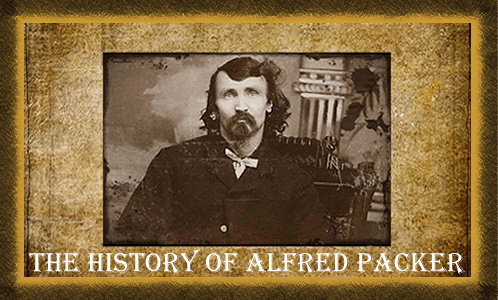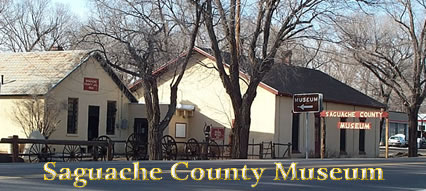Alfred G. “Alferd” Packer (January 21, some historical notes say it was on November 21, 1842 – April 23, 1907) was an American prospector who was accused of cannibalism during the winter of 1873-1874. First tried for murder, Packer was eventually sentenced to 40 years in prison after being convicted of manslaughter. The biopic of Your Life, The Legend of Alfred Packer, was made in 1980.
 Alfred Packer was born in Allegheny County Griner, Pennsylvania, one of three children of James Packer and his wife Esther Griner. By early 1850, the Packer family had to move to Lagrange County, Indiana, where his father took a job joiner.
Alfred Packer was born in Allegheny County Griner, Pennsylvania, one of three children of James Packer and his wife Esther Griner. By early 1850, the Packer family had to move to Lagrange County, Indiana, where his father took a job joiner.
Alfred Packer served in the Union Army in the American Civil War, enlisting on April 22, 1862 in Winona, Minnesota in the 16th U.S. Infantry, his occupation was a shoemaker. However, he was discharged by reason of epilepsy, eight months later at Fort Ontario, New York. He turned west and joined the 8th Cavalry Regiment in Ottumwa, Iowa on June 25, 1863, but was discharged in Cleveland, Tennessee on April 22, 1864 for the same reason. He finally decided to try his luck in the exploration of precious metals.
In November 1873, Packer with 21 men who left Provo, Utah, pair Breckenridge Colorado in search of gold. On 21 January 1874 he met the Indian Chief Ouray, known as White Man’s Friend, near Montrose, Colorado. Chief Ouray recommended they postpone the expedition until spring, since the dangerous winter in the mountains.
Ignoring Ouray’s advice, Packer and five others left for Gunnison, Colorado, on February 9. In addition to Packer, the group included: Shannon Wilson Bell, James Humphrey, Frank “Reddy” Miller, George “California” Noon, and Israel Swan.
The walk was heavy and they were lost and were left without water, food or any provisions. They were up snowbound in the Rockies. Packer made three confessions that differed considerably about what happened. Packer said he was looking for food and came back, he said, was Shannon Bell roasting human flesh. Bell came hastily with an ax at him (Packer) who shot and killed in self-defense. Packer insisted that Bell had gone mad
and killed everyone else.
On April 16, 1874, Packer arrived alone at Los Pinos Indian Agency near Gunnison. He spent some time in Saguache, Colorado, finding several of his fellow travelers who had chosen to follow the advice of Indian Head. He claimed self-defense, but his story was not believed. During the trial, the presiding judge, MB Gerry said: “Close your ears to the blandishments of hope. Hear their promises fluttering life. But prepare to meet thy spirits of the murdered victims. Brace yourself for sure fear of death.”
Packer signed a confession on August 5, 1874. He was jailed in Saguache, but escaped soon after.
The Memorial to the victims of alleged Packer is at the scene, southeast of Lake City, Colorado.
On March 11, 1883, Packer was discovered in Cheyenne, Wyoming, living under the alias of “John Schwartze.” On March 16, he signed another confession. On April 6, a trial began in Lake City, Colorado. On April 13, he was found guilty of manslaughter and sentenced to death. In October 1885, the sentence was overturned by the Supreme Court of Colorado as being based on a law: ex post facto. On June 8, 1886, Packer was sentenced to 40 years in another trial in Gunnison. At the time, this was the largest penalty in U.S. history.
On June 19, 1899, the sentence was upheld by Packer Colorado Supreme Court. However, he was released on February 8, 1901, and was working as a guard at the Denver Post. He died in Deer Creek, in Jefferson County, Colorado, supposedly “Senility, problems and concerns” at the age of 65. There is rumored to have become a vegetarian before his death. He was buried in Littleton, Colorado. His grave is marked with a tombstone veteran listing its original regiment in 1862.


